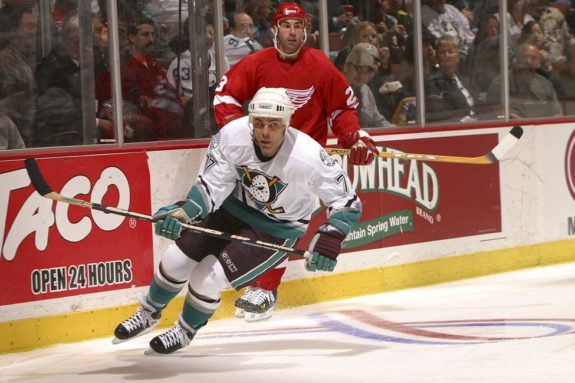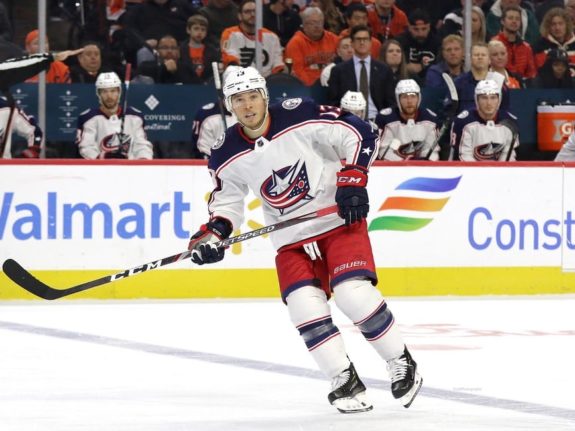The atmosphere, the do-or-die mentality and, in the end, the reception of the most iconic trophy in sports: there’s nothing quite like playoff hockey.
All the way from Game 1 of the first round to Game 7 of the Stanley Cup Final, the drama never seems to cease, and nothing heightens that drama like overtime.
Sign up for our NHL History Substack newsletter
Unlike the regular season, this overtime isn’t a five-minute period of three-on-three hockey that can be settled by a game-deciding shootout. The teams play five-on-five until a winner is crowned. As you can imagine, that can sometimes take a while.
The longest such game in history came in 1936 between the Detroit Red Wings and Montreal Maroons. After three shutout periods, the two teams entered overtime. Five periods later, the score was still 0-0. After a whopping 116 minutes of overtime, Mud Bruneteau won the game for the Red Wings in the sixth extra period.
In the past 90 years, players have gotten faster and more skilled. Due to this, games are often decided more efficiently, making even two or three overtime periods a rarity.
However, in the post-expansion era, there have been a number of games that have trickled into the early hours of the following morning. Without further ado, here are the six longest playoff games in the post-expansion era:
Longest Post-Expansion Playoff Games
No. 6: Vancouver Canucks vs. Dallas Stars (Apr. 11, 2007) – 138:06
It was Game 1 in the first round of the 2007 Stanley Cup Playoffs when Roberto Luongo got his first postseason start. Little did he know, he would play more than two games’ worth of periods before the night was done.
The contest took nearly seven whole frames to decide – and it was a back-and-forth battle all night long. Daniel Sedin opened up the scoring less than five minutes into the game. However, just over a minute later, Brendan Morrow tied things up on the power play.
Related: “The Sedin Twins and the 1999 NHL Entry Draft”
Vancouver responded via Mattias Ohlund’s power-play goal to start the second frame while Dallas’ Trevor Daley potted a goal less than four minutes later. This back-and-forth exchange continued until the Canucks nabbed a 4-2 lead 7:36 into the third period. Less than a minute later, Anti Miettinen made it 4-3 before Ladislav Nagy tied the game with just over six minutes remaining in regulation.
With under two minutes to go in the fourth overtime period, Henrik Sedin sent the Vancouver faithful home tired, yet happy. Dallas goaltender Marty Turco finished the evening with 51 saves. At the other end of the rink stood an elated Luongo who managed to stop a whopping 72 shots.

The seven-game series featured two more overtimes. After taking a 3-1 series lead, the Canucks lost Games 5 and 6 before saving their skin via a decisive 4-1 victory in Game 7. Their second-round series against the Anaheim Ducks saw two games that required double overtime. Though Vancouver was able to earn a victory in one of those meetings, Anaheim took the series in five games and went on to win the Stanley Cup.
No. 5: Washington Capitals vs. Pittsburgh Penguins (Apr. 24, 1996) – 139:15
Between the battle of Sidney Crosby versus Alexander Ovechkin, and the two teams getting together for three playoff series in the past four seasons, the Pittsburgh Penguins and Washington Capitals have developed quite the rivalry.
However, the two clubs’ first-round series in 1996 was on another level. The Caps held a 2-1 lead in the series and after snagging a 2-0 lead halfway through Game 4, they were within reach of a 3-1 series lead heading back to Pittsburgh.
The Penguins mounted a comeback, starting with a short-handed goal from Jaromir Jagr with less than two minutes remaining in the second frame. However, less than a minute later, things got out of hand.
Washington’s Todd Krygier and Pittsburgh’s Mario Lemieux had a disagreement of sorts: the two tied each other up in the Penguins’ zone. The Capital got his stick between the legs of Lemieux who was knocked to the ice. Krygier went after him, knocking off his helmet before getting back into the play.
It’s safe to say Lemieux wasn’t happy with this as he proceeded to slash Krygier from behind. A wrestling match ensued as Washington’s Pat Peake dropped the gloves and pounced on Lemieux. When the dust settled, Lemieux and Peake were handed game misconducts while Krygier merely received a roughing minor.
Related: “Remembering What Made Mario Lemieux the Greatest”
From the third period onward, five roughing and two slashing minors were called. In total, there were 75 penalty minutes handed out between the two teams.
Petr Nedved was able to capitalize on one of Pittsburgh’s many power plays in the seventh period. He faked a slap shot from the point before skating around a sprawling defenseman and sent a blooper toward the net. Washington netminder Olaf Kolzig fought through a sea of Caps and Pens but couldn’t muster a save.
With 15 seconds remaining in the fourth overtime, the Penguins tied the series at two games apiece and went on to win Games 5 and 6 to move on. Pittsburgh was eventually knocked out by the Florida Panthers in the Eastern Conference Final, but their seven-period bought with the Capitals remains the third-longest postseason game in the post-expansion era.
No. 4: Florida Panthers vs. Carolina Hurricanes (May 18, 2023) – 1:39:47
The Florida Panthers qualified as the eighth and final Eastern Conference playoff team, but they are having a memorable postseason run. After rallying from a 3-1 series deficit to stun the Presidents Trophy-winning Boston Bruins in seven games in the first round, they took down the Toronto Maple Leafs in five games in the second round to advance to the Eastern Conference Final against the Carolina Hurricanes. If upsetting those teams were not enough memories to make, then did it again in Game 1 in North Carolina.
Florida won their seventh consecutive road game of the postseason and it took a lot longer than expected. Carolina grabbed a 1-0 first-period lead on a Seth Jarvis power-play goal. The Panthers, as they have done all postseason, rallied and took a 2-1 lead through two periods with second-period goals from Aleksander Barkov and Carter Verhaeghe. After Carolina tied it on a Stefan Noesen third-period goal, the two teams settled in for a long night of hockey.
Through three overtimes, neither team was able to solve the opposing goalies. Florida’s Sergei Bobrovsky made 25 saves and Carolina’s Frederik Andersen stopped 26. In the fourth overtime, the Hurricanes had eight shots stopped by Bobrovsky, but the Panthers were finally able to solve Andersen. With just 13 seconds remaining in the fourth extra session, Florida took advantage of a clearing attempt hitting a referee and when Sam Bennett collected the puck along the wall, he passed it to Matthew Tkachuk and he ended the game by beating Andersen from the face-off circle for a 4-3 victory.
“Probably my favorite [goal] I’ve scored in my life,” said Tkachuk. “It was big to not let it go to five overtimes there.”
What a way to open the series for the Panthers. It was their fifth overtime win in the playoffs, two against Boston in elimination games and two against Toronto, including the series-clincher in Game 5. Florida acquired Tkachuk in the summer of 2022 from the Calgary Flames in a deal that included Jonathan Huberdeau and MacKenzie Weegar going to the Flames. The goal in Game 1 was Tkachuk’s sixth of the postseason in 13 games and he has given his new team a makeover mentally in the playoffs.
For the game, Bobrovsky made 63 saves and Andersen made 57. Florida defenseman Brandon Montour logged 57:56 of ice time and Carolina blueliner Brent Burns played 54:43 to lead their respective teams. For the game, the two teams combined for 125 shots on the net, 81 hits, and 77 blocks. Neither team will forget the game that started at 8:10 p.m. Eastern Standard Time and finished right before 2 a.m. the next morning.
No. 3: Mighty Ducks of Anaheim vs. Dallas Stars (Apr. 24, 2003) – 140:48
On the seventh anniversary of the epic battle between the Penguins and Capitals, the Stars faced off against the Mighty Ducks of Anaheim for Game 1 of their second-round series. It was the first time the two franchises met in the postseason.
Dallas had just rebounded from a 2-1 series deficit to the Edmonton Oilers in the first round with three-straight wins. At the other end of the rink stood the Mighty Ducks. The seventh-seeded team shocked the second-seeded Detroit Red Wings with a sweep
Jason Krog opened up the scoring halfway through the first frame before Dallas’ Derian Hatcher responded to tie the game 1-1. In the second period, Rob Niedermayer potted a short-handed goal and, five minutes later, Steve Rucchin handed the Mighty Ducks a 3-1 lead.
Before the end of the frame, Jason Arnott drew the Stars within one. Anaheim was on the verge of cementing the win when Brendan Morrow scored with less than three minutes to go in regulation. The late tally forced what would go on to be a total of five overtimes.
After four extra periods, the game was still undecided. After a long wait, a pass from Adam Oates found Petr Sykora to put an end to the battle less than a minute into the fifth overtime.

Oates went on to score the opening goal of Game 2 which required just one overtime. Anaheim managed to claim the victory and worked their way to a 4-2 series win. After sweeping the Minnesota Wild in the Western Conference Final, the Mighty Ducks fell to the New Jersey Devils in Game 7 of the 2003 Stanley Cup Final.
No. 2: Columbus Blue Jackets vs. Tampa Bay Lightning (Aug. 11, 2020) – 150:27
Coming off a Game 5 win-or-go-home game against the Toronto Maple Leafs two nights earlier in the qualifying round, the Blue Jackets didn’t have much time to celebrate or prepare for Game 1 of their matchup against the Lightning. It didn’t matter. Absolutely nothing could have prepared them for the five-overtime series opening thriller that was epic on every level.
Pierre-Luc Dubois got the Blue Jackets on the scoresheet first with a power play tally, just 2:39 into the game, but Brayden Point evened the game less than four minutes later. Oliver Bjorkstrand put the Blue Jackets ahead with a late goal in the second period, but just 23 seconds into the third period, Yanni Gourde knotted the game at two. It was an Eagle Scout-worthy knot…lasting five overtimes.
Brayden Point finally ended the game in the fifth frame of bonus hockey, launching a shot that found a sliver of space above netminder Joonas Korpisalo’s shoulder and under the crossbar. “I just see a rolling puck and I just throw it on net,” Point said after lighting the lamp and giving the Lightning a 3-2 victory. “I’m not really aiming. Just sling one there and lucky enough it finds a corner.”
It was a tough pill to swallow for the Finnish netminder who finished with 85 saves. He stood on his head all night, making countless save after save. The Lightning had a whopping 187 shot attempts, peppering him all night long.
At the other end of the rink, Vezina Trophy finalist Andrei Vasilevskiy registered 61 saves. The combined 151 shots were the most in an NHL game since the league began officially tracking the statistic in 1955-56.
The mind-boggling stats from the odyssey on ice included Blue Jackets’ defenseman Seth Jones, logging an NHL-record 65:06 of ice time. Despite skating for over an hour, Jones said he felt “fine” after the game. Teammate Zach Werenski was the only other player to top 60 minutes of ice time (61:14).
“There was fatigue on all ends–mental and physical. It wasn’t too hard to go to sleep after the game,” said Kevin Shattenkirk with a grin.
“I remember looking over at my salmon salad and wanting to eat it the whole time during the game, but thinking it might break up the karma, so I stayed hungry, said smiling Bolts coach Jon Cooper.
In an interesting bit of trivia, every skater for both teams registered at least one shot on goal during the game. The lone exception? Cam Atkinson. Despite nearly 40 minutes of ice time, the forward who has six seasons of 20 or more goals, failed to take a single shot.

“It was an unreal performance by both teams, but especially by both goaltenders,” said Bolts blueliner Victor Hedman. “They don’t get to sit on the bench for a couple minutes, they have to be sharp the entire time.”
In the locker room between periods, there were plenty of laughs and joking around. “I don’t know if that’s just because we were so exhausted that was the only thing we could do or what it was,” said Bolts forward Tyler Johnson. “It’s a different game. I’m proud to be a part of it, but at the same time I don’t know if I ever want to do it again.”
While the game will be remembered by fans, players and media alike, the sad part about it… because of COVID-19, there was no one in the building to witness it.
No. 1: Philadelphia Flyers vs. Pittsburgh Penguins (May 4, 2000) – 152:01
The Battle of Pennsylvania is an iconic rivalry in hockey, and it feels fitting that the two combatants hold the record for the longest playoff game in the post-expansion era.
Related: “Pennsylvania Hockey: A Long, Proud History”
The Philadelphia Flyers found themselves in a 2-0 hole during the second-round series. Having dropped both Games 1 and 2, the odds were stacked against them as they flew into Pittsburgh for Games 3 and 4. The Flyers were able to take Game 3 by a score of 4-3 in overtime, but Game 4 took a bit longer to decide.
Pittsburgh’s Alex Kovalev opened the scoring less than three minutes into regulation. For the next 42 minutes of play, it was a classic goaltender duel. Penguins netminder Ron Tugnutt finally gave way in the 4:47 into the third period. A John LeClair power-play goal knotted things at 1-1.
However, the goaltender duel resumed and lasted for another five periods of play. Halfway through the fifth overtime, there hadn’t been a power play awarded to either side for nearly 40 minutes of play. It was a five-on-five fight to the finish, and Philadephia got the last word.
12:01 into the fifth extra frame – and 152:01 into the game as a whole – Keith Primeau claimed victory for his fellow Flyers. The men in orange went on to win Games 5 and 6 to send the Penguins back home to Pittsburgh.
Philadelphia put up a fight in the Eastern Conference Final. They had earned a 3-1 lead in the series but collapsed, losing Games 5 through 7 to the Devils.
The Next One?
The league has gone through a huge transformation throughout the past decade. Teams have opted for a speedier, more offensively gifted approach as opposed to building their rosters around physicality or defense – a common theme in the 1990s and early 2000s. This has seemed to make multiple-overtime games a rarity as offenses are more capable of defeating opposing netminders. However, hockey is arguably the most unpredictable of the four major North American sports. It seems that every season onlookers are in for some sort of surprise, whether that’s an astounding upset or an obscure record being broken.
